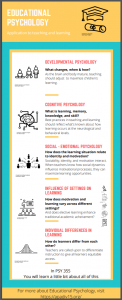Erica Kleinknecht, PhD
August 18th, 2020
In the summer of 2019, I entered into a teaching swap. An early career orchestra teacher gave me beginning guitar lessons and I created for her a tailored seminar in educational psychology topics selected just for her. After her first year on the job, she realized she had many questions related to cognition, identity, and motivation that were not addressed in her teacher-preparation coursework. The swap ended up being of value to both of us. And really, what a delightful way to spend a summer! We both love teaching and learning and music and shared our expertise with each other for nearly two months. As the next school year started, my friend felt that what covered was really beneficial. How wonderful.
 As such, early in January 2020, my reading list and discussion notes in hand, I developed a proposal for a new course reflecting that summer “seminar” experience. I pitched the course to music education majors, and described it as an extension to the standard educational psychology coursework they were required to take. That is, I pitched it as an elective. By the time students began to register for summer and fall 2020 courses, the corona-virus had taken hold of our lives, and the format of summer school had to change. My thinking about the course had changed too. Rather than limit enrolled students to one kind of teaching application, I realized that we would all get more out of the course if it were expanded to include a variety of teaching (or coaching, mentoring, or therapy) experiences. And with that, enough students enrolled in the course to make it a “go.”
As such, early in January 2020, my reading list and discussion notes in hand, I developed a proposal for a new course reflecting that summer “seminar” experience. I pitched the course to music education majors, and described it as an extension to the standard educational psychology coursework they were required to take. That is, I pitched it as an elective. By the time students began to register for summer and fall 2020 courses, the corona-virus had taken hold of our lives, and the format of summer school had to change. My thinking about the course had changed too. Rather than limit enrolled students to one kind of teaching application, I realized that we would all get more out of the course if it were expanded to include a variety of teaching (or coaching, mentoring, or therapy) experiences. And with that, enough students enrolled in the course to make it a “go.”
Before the course began I polled students about their interests and I made sure to include at least one reading that would be clearly related to their particular interests and experiences. Enrolled students interests were varied and some had extensive teaching experience already, others had none. All, of course, had quite a bit of experience as students though, and so as the class rolled along, while learning new content we also learned about how it might apply to many different teaching and learning contexts. Over the span of 4 weeks, the students and I dove in to the course content undaunted by our Zoom connection. It really was a fantastic course.
In the chapters that follow, you will see how each student took the course material and applied it to a context of their own choosing. Each section is comprised of three chapters, all tailored to the context: Early Childhood Education, Creative Writing, Math, Cheer Coaching, School Counseling, and Occupational Therapy. While the authors are undergraduates, the knowledge they’ve gained and shared here is sound. Readers can trust that the recommendations are couched in empirical research and theory. We hope that you enjoy reading and that you find it useful as well! And if you want to read further yourselves, you will find the class reading list in the appendix.
Sincerely,
Erica Kleinknecht, PhD
Professor of Psychology, Pacific University Oregon
Full size Infographic: What is EdPsy InfoGraphic
